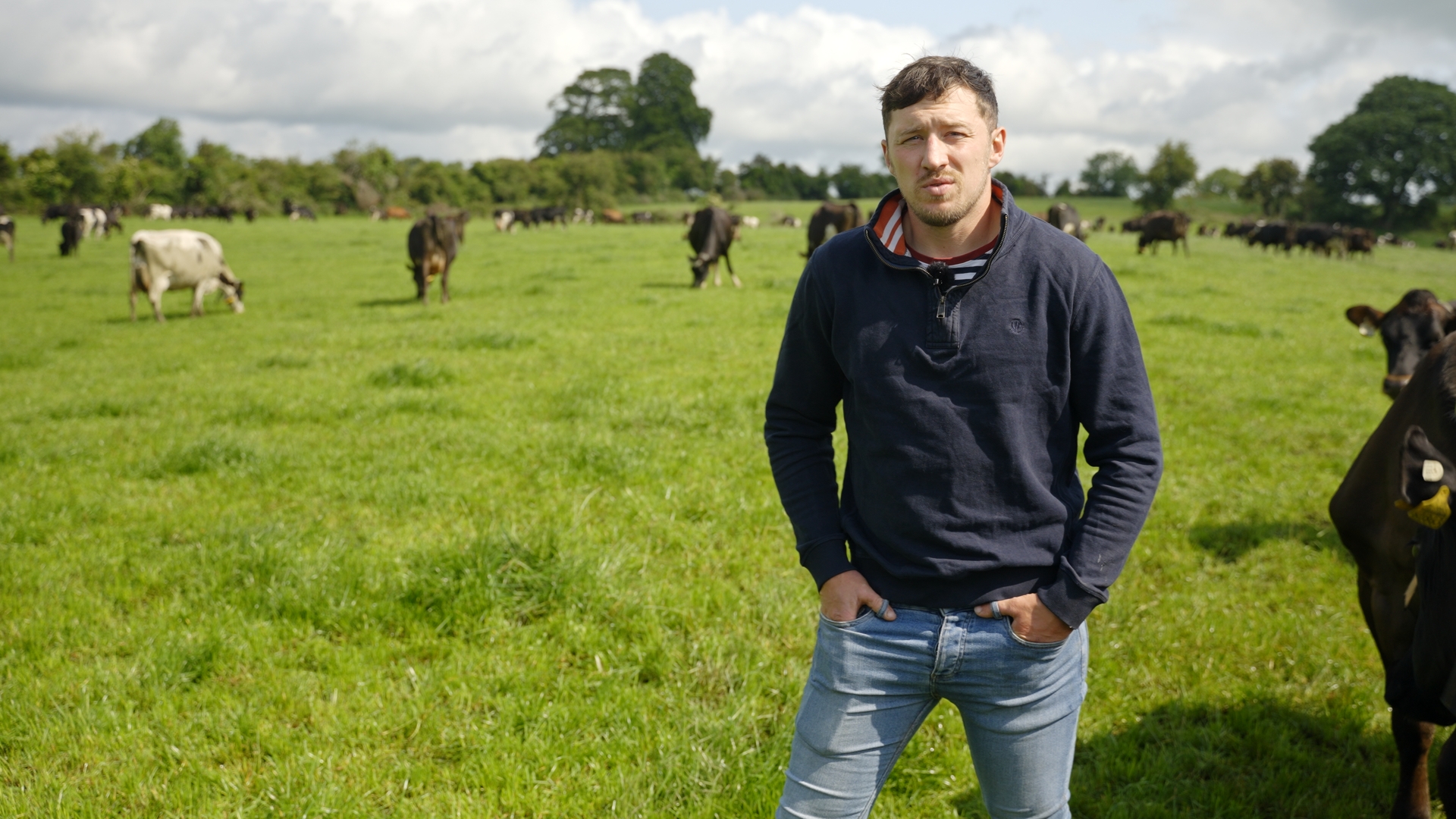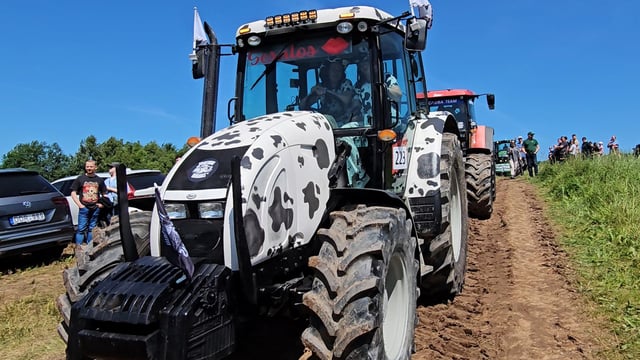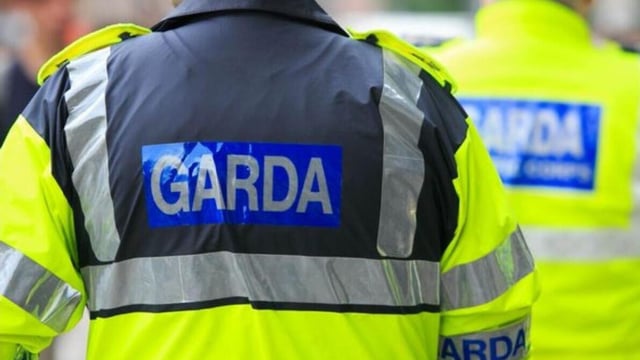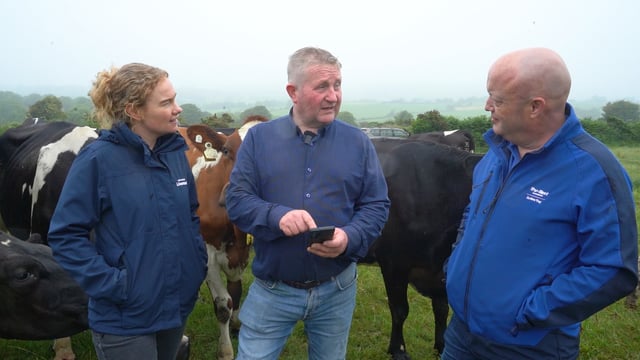Sponsored Article
Sponsored Article
How genotyping is powering performance on a Co. Westmeath share farm
Sponsored Article
Co. Westmeath farmer Christopher Cahill shares the real on-farm benefits of genotyping - from identifying top cows to producing in-demand beef calves.
Originally from Co. Cavan, Christopher has built a career rooted in sustainable farming.
After earning a degree in Agricultural Science at University College Dublin and completing a Master’s in Sustainable Agriculture, he worked in industry for nearly six years with Lakeland Agri.
Today, Christopher is share farming a 240-cow crossbred dairy herd in Delvin, Co. Westmeath, with Tony McCormack.
Their partnership was established in early 2022 through the Macra Land Mobility Programme and began with 110 British Friesian cows.
Since then, the herd has grown steadily to over 240 crossbreds, underpinned by strong herd management, clear breeding goals, and a willingness to embrace technology.
- One of the most striking indicators of progress has been the consistent rise in the herd’s Economic Breeding Index (EBI)—from €112 in 2021 to €237 in 2025;
- The herd’s average calving interval is 368 days and the 2025 spring six-week calving rate was 81%;
- In 2024, the fat % for the herd was 4.83, which was in the top 2% across Lakeland herds;
- In 2024, the herd protein % was 3.75, which was in the top 4% across Lakeland herds.
Christopher opted into the National Genotyping Programme (NGP) early on to enhance breeding decisions and gain a more detailed view of herd potential.
He said: “I thought it would just give me more detailed information on each cow and higher levels of accuracy and reliability on each cow for making breeding decisions.”
As part of Phase 1 of the NGP in 2023, all breeding females were genotyped in preparation for spring 2024 calving.
The results helped confirm Christopher’s instincts about his best cows - while also backing them up with reliable data.
“When we actually genotyped the herd, I felt it was a better representation of what I felt was my best cows," he said.
To date, registering calves via the DNA process has worked very well on the farm.
Regularly posting samples meant that Christopher did not experience any delays - in 2025, the average time Christopher’s samples spent in the lab was just 3.5 days.
“The average turnaround time was a little over two weeks from sending away the samples to getting back our blue cards. The turnaround time got better in 2025 compared to 2024," he said.
While high levels of data recording are standard practice on farm, Christopher acknowledges the advantages of genotyping in eliminating errors.
He recalled one situation during the calving season where genotyping proved its worth.
“We had two jet black heifer calves. The dams were standing very protectively beside them. We marked them down for what appeared to be the dam/daughter relationship.
"But when the genotypes came back, they were actually belonging to the opposite cow.”
Christopher considers the genomic and milk recording information when deciding the breeding strategy.
Breeding replacements from the top-performing cows with sexed semen has enabled the farm to accelerate genetic gain, while also allowing for beef artificial insemination (AI) usage much earlier on in the breeding season.
“By breeding heifer replacements from our best cows, we are accelerating our genetic gain," Christopher explained.
“Because we know the cows that we want the dairy replacements from, we actually have saleable beef calves very early in the calving season and we’ve got regular buyers for those.”
In addition to dairy and beef AI, Christopher runs three stock bulls with the herd, rotating them daily.
He said genotyping has played a key role in assessing bull performance.
“Through the genotyping process, we were able to identify which bull was doing the work and identify which stockbull was actually throwing better calves,” Christopher said.
This level of insight has supported tighter control over genetics and more informed decisions about which bulls to retain or replace.
For herds participating in the Dairy Beef Welfare Scheme (DBWS), being in NGP is a huge benefit.
With a payment of €20 per eligible calf, up to a maximum of 50 calves, the DBWS is worth up to €1,000 to participating herds.
To be eligible for the €20 payment, a calf’s sire must be genotyped.
Genotyping can cost anywhere from €18 to €30. However, herds who sign-up to NGP will get any ungenotyped stock-bulls genotyped for free.
One of the biggest challenges with DBWS is tracking which bull served which cow - especially if running multiple stockbulls in groups.
NGP will confirm which calves are from eligible bulls, helping you meet scheme requirements with less paperwork and guesswork.
Genotyping your calves can provide a lot of extra assurance for potential buyers such as having parentage verification and the Commercial Beef Value (CBV) of the calf displayed on the martboard at sale, all of which can help add value to your dairy-beef calves.
In 2025, Christopher and Tony invested in Censortech heat detection collars, allowing them to move away from synchronisation protocols and focus on natural heat cycles.
This transition has aligned well with their use of sexed semen.
The use of sexed semen is standard practice in the herd, however, some conventional semen is still used where the cow is outside of the optimum timing for sexed.
For Christopher, genotyping is a no-brainer for any livestock enterprise focused on continuous improvement.
He said: “I’d absolutely recommend anyone to sign up, be it dairy or beef, whatever business you’re in. I think the information it gives you is invaluable. It really informs your breeding decisions.
“You’re accelerating your genetic gain but equally you’re also improving the beef calf that is going to the calf to beef farmer as well, which is great.”
The share farming model Christopher and Tony have built is based on forward thinking, and a shared drive for performance.
With genotyping and precision tools now fully embedded in their system, they are proving how innovation, when applied with purpose, can yield the best results on the ground.
As more farmers get on board with genotyping, this Co. Westmeath farm shows the benefit of getting in early - combining hands-on farming, smart breeding, and science to drive profits and build a stronger future.
If you are interested in signing up to the National Genotyping Programme, go to the ICBF website, or contact the HerdPlus team by calling 023-8820452 or emailing [email protected]
Sponsored Article






